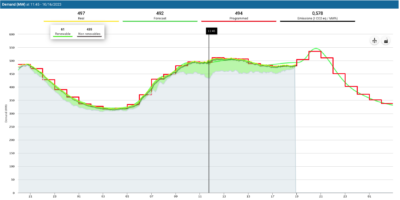The ongoing conflict in the middle-east, between Hamas and Israel, is reverberating across global energy markets, and the Canary Islands are no exception. Gas prices have surged by 44.6% since the start of the Gaza conflict on October 7th, reaching €55.30 per megawatt-hour (MWh) in the European reference market, the Dutch TTF. In parallel, Brent crude oil has increased by 7.7% over the past week, reaching $91 per barrel.
 Breaking down the prices throughout the day, consumers will face the highest electricity prices between 7:00 PM and 8:00 PM, peaking at €220 per MWh. On the other hand, the lowest rates will be between 4:00 AM and 5:00 AM, at €110.24 per MWh, according to provisional data from the Iberian Energy Market Operator (OMIE).
Breaking down the prices throughout the day, consumers will face the highest electricity prices between 7:00 PM and 8:00 PM, peaking at €220 per MWh. On the other hand, the lowest rates will be between 4:00 AM and 5:00 AM, at €110.24 per MWh, according to provisional data from the Iberian Energy Market Operator (OMIE).
Natural Gas plays a crucial role in Spain’s electric power mix, accounting for roughly 30% of the energy sources used in Spain for electricity generation. This includes combined cycle power plants and cogeneration, where biomass and other renewable sources are also utilised, as reported by Red Eléctrica de España (REE).
The surge in gas prices coincides with Israel’s decision to close a natural gas field on its coast managed by the U.S. company Chevron for security reasons. Additionally, experts suggest that a ruptured gas pipeline in Finland, which may not operate again until early 2024, has contributed to this significant price increase following two weeks of declines.
 In contrast to the trend seen in other European markets, the average electricity market price in Spain has averaged around €115.7/MWh in October, compared to €143.08/MWh during the same period last year, as we entered the first winter of the Russian invasion of Ukraine.
In contrast to the trend seen in other European markets, the average electricity market price in Spain has averaged around €115.7/MWh in October, compared to €143.08/MWh during the same period last year, as we entered the first winter of the Russian invasion of Ukraine.
Last month, September, closed with an average price of €103.3/MWh, in contrast to September 2022’s €141.07/MWh, making this the most expensive month since February 2023.
The “Iberian exception” remains in effect until December 31st, as agreed upon by Spain and Portugal with the European Commission. This agreement allows for a special mechanism that can be applied to regulate electricity prices in the Iberian Peninsula, including the Canary Islands, to mitigate extreme price fluctuations., it has not affected the electricity market since late February due to the decline in natural gas prices below the thresholds set for its application.
In addition to the average ‘pool’ price, consumers benefiting from this measure, such as those on regulated tariffs (PVPC) or those with indexed tariffs in the free market, who do not have to pay any compensation to gas companies. This situation has persisted since February 27th, with compensation costs remaining at 0 euros/MWh.













